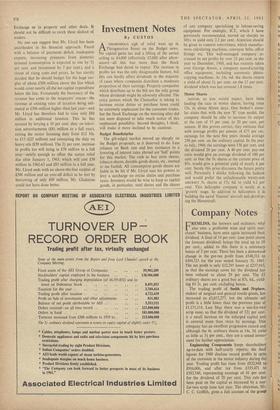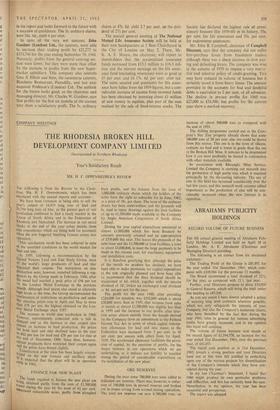Company Notes
REMLINS, the brewers and maltsters, who also own a profitable wine and spirit mer- chants' business, have once again increased their dividend. A final of 14 per cent. (one point above the forecast dividend) brings the total up to 18 per cent.; added to this there is a centenary bonus of 2 per cent. There has been a downward change in the pre-tax profit from £548,511 to £494,523 for the year ended January 31, 1961. The net profit is only £32,295 lower at £237,943, so that the earnings cover for the dividend has been reduced to about 29 per cent. The £1 ordinary shares are a good buy at 87s. 6d., yield- ing £4 2s. per cent. excluding bonus.
The trading profit of Smith and Nephew, makers of surgical and general textile goods, has increased to £3,052,277, but the ultimate net profit is a little lower than the previous year at £1,151,114. Last May there was a one-for-two scrip issue, so that the dividend of 124 per cent. is a small increase on the enlarged capital and is covered more than twice by earnings. This company has an excellent progressive record and although the 4s. ordinary shares at 14s. 3d. yield as little as 3+ per cent., they are a sound invest-' ment for further appreciation.
Engineering Components keeps shareholders up-to-date with half-yearly reports; the final figures for 1960 disclose record profits in spite, of the recession in the motor industry during the year. Trading profit has risen from £832,948 to; £916,006, and after tax from £335,471 to £383,540, representing earnings of 41 per cent.
for the dividend of 20 per cent. This rate has been paid on the capital as increased by a onc- for-two scrip issue last year. The chairman, Mr. C. C. Griffith, gives a full account of the group in his report and looks forward to the future with a measure of confidence. The 5s. ordinary shares, now 16s. 6d., yield 6 per cent.
In spite of the very wet summer, John Gardner (London) Ltd., the caterers, were able to increase their trading profit by £23,272 to £374,740 for the year ending September 30, 1960. Naturally, profits from the general catering sec- tion were lower, but they were more than offset by the increase in profits from the new Super- market subsidiary. This company also controls Geo. S. Elliott and Sons, the racecourse caterers, Hatchetts Restaurant, Piccadilly, and last year acquired Prideaux's (London) Ltd. The outlook for the future looks good, as the chairman and managing director, Mr. Charles W. Gardner, says that profits for the first six months of the current year show a satisfactory profit. The Ss. ordinary
shares at 47s. 6d. yield 2.7 per cent. on the divi- dend of 27+ per cent.
The annual general meeting of The National Mutual Life Assurance Society will be held at their new headquarters at 5 Bow Churchyard in the City of London on May 2. There, Mr. K. A. E. Moore, the chairman, will report to shareholders that the accumulated assurance funds increased from £15.3 million to £16.3 mil- lion and the interest earnings on the life assur- ance fund (excluding reversions) were as good as £() per cent. and £4 17s. 4d. per cent. after tax. The sums assured and premiums for life assur- ance have fallen from the 1959 figures, but a con- siderable increase of income from invested funds has been obtained by investing about £1 million of new money in equities, plus part of the sum realised by the sale of fixed-interest stocks. The
Society has declared the highest rate of rever- sionary bonuses (for 1959-60) in its history, 55s. per cent. for life assurances and 50s. per cent. for endowment assurances.
Mr. John B. Campbell, chairman of Campbell Discount, says that the company did not suffer hire-purchase losses from fraudulent traders although there was a sharp increase in slow pay- ing and defaulting hirers. The company was wise in the autumn of 1959 to impose a very restric- tive and selective policy of credit-granting. This may have reduced its volume of business but it certainly saved it from heavy losses. The amount provided in the accounts for bad and doubtful debts is equivalent to 2 per cent. of all advances. The decline in pre-tax profits for 1960 was £27,000 to £74,500; but profits for the current year show a marked recovery.















































 Previous page
Previous page